Unpacking the Infant Formula Recall and Formula Shortage with Helena Bottemiller Evich
- The current formula recall that is affecting the country and a detailed explanation on what triggered this event
- The timeline of how the reports began and WHEN and HOW the Food Drug Administration, Center for Disease Control and Abbott Nutrition company responded to these concerns
- Suggestions on how parents and caregivers can help each other during these hard times of formula recall and formula shortage
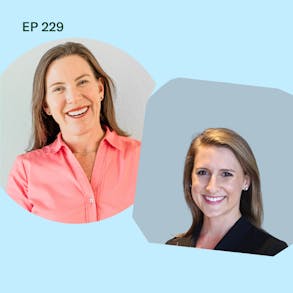
LISTEN TO THIS EPISODE
PODCAST EPISODE SHOW NOTES
In recent months, there has been a downpour of information that has been released in regards to the current formula recall which has resulted in a considerable amount of formula shortages. In this episode, I am joined by researcher and writer Helena Bottemiller Evich who is the senior food and agriculture reporter at Politico and has followed closely on the topic. Helena is here to provide us with a look behind the unfortunate shortage of formula and the hard times that many parents are facing while trying to feed their formula-fed babies.
LISTEN TO THE EPISODE
SUMMARY OF EPISODE
In this episode, Helena will be talking about:
The current formula recall that is affecting the country and a detailed explanation on what triggered this event
The timeline of how the reports began and WHEN and HOW the Food Drug Administration, Center for Disease Control and Abbott Nutrition company responded to these concerns
Suggestions on how parents and caregivers can help each other during these hard times of formula recall and formula shortage
ABOUT THE GUEST
Helena Bottemiller Evich is the senior food and agriculture reporter at POLITICO, where she writes about the policy and politics that shape our food system, from the farm bill to school lunch.
She has received numerous awards for her work, including a George Polk Award for a series on climate change and two James Beard Awards for features on nutrition and science.
Before joining POLITICO in 2013, she was a reporter at Food Safety News where she covered deadly foodborne illness outbreaks and the run-up to Congress passing the most significant update to food safety law in a century.
Her work is widely cited in the media and has also appeared in the Columbia Journalism Review and on NBC News.
LINKS FROM THIS EPISODE
To follow and learn more about Helena Bottemiller Evich:
Follow her twitter @hbottemiller
Follow her on IG @heleenabena
Follow @politico
To read more articles CLICK HERE
To be placed in the early list of her upcoming food policy newsletter:
Email hbevich@gmail.com
Formula recall articles:
How the FDA’s food division fails to regulate health and safety hazards
Senators demand answers from Abbott on infant formula recall ARTICLE
FDA Investigation of Cronobacter Infections: Powdered Infant Formula (February 2022)
Whistleblower warned FDA about formula plant months before baby deaths
TRANSCRIPT OF EPISODE
WANT MORE BLW INFO?!
SUBSCRIBE to the BABY-LED WEANING MADE EASY PODCAST - new episodes are released on Monday and Thursday and subscribing means you’ll never miss what’s new (+ you’ll get notified about special bonus episodes too!)...subscribe here.
Grab my free download called 10 EASY STARTER FOODS FOR BABY-LED WEANING - sometimes just getting the confidence to get going will help you realize your baby CAN and WANTS to do this self-feeding thing! < < CLICK HERE FOR THE 10 STARTER FOODS DOWNLOAD > >
REGISTER for my free online workshop BABY-LED WEANING FOR BEGINNERS: How to get your baby to try 100 foods before turning 1 without you having to spoon-feed purees or buy pouches. Everyone on the workshop gets a copy of my 100 FIRST FOODS list so you’ll know exactly what foods babies CAN eat when they’re ready for BLW! Register for this week’s workshop times here.

Latest Episodes
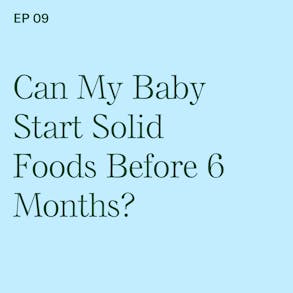
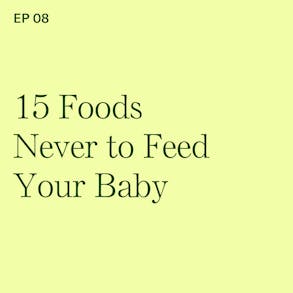
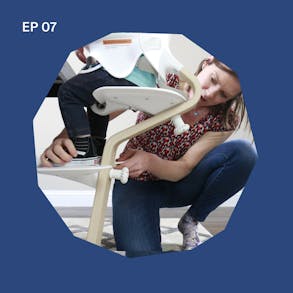
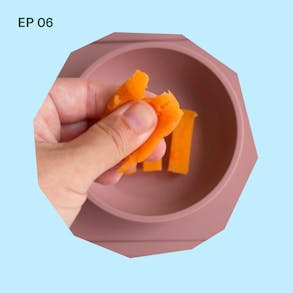
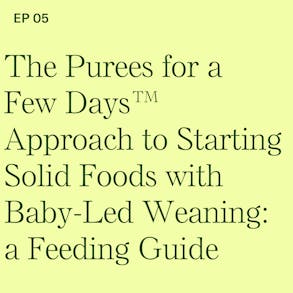
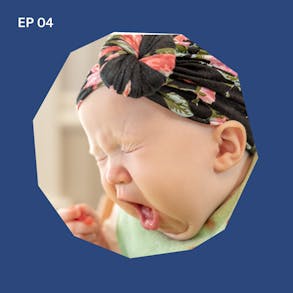
Katie Ferraro (1m 14s):
Hey, there I'm Katie Ferraro Registered Dietitian, college nutrition, professor and mom of seven specializing in baby-led weaning here on the BABY-LED WEANING Made Easy Podcast. I help you strip out all of the noise and nonsense about feeding, leaving you with the competence and knowledge. You need to give your baby a safe start to solid foods using baby Led Weaning. Hi guys, here to talk about the infant formula recall and the shortage. And I know this is an incredibly stressful topic and reality for a lot of you, and it's definitely not a topic that we take lightly in infant feeding and nutrition.
Katie Ferraro (1m 54s):
And so I'm really excited that today's guest can join us. She's Helena Bottemiller Evich. She is the senior food and agriculture reporter at Politico. She is an incredible person, incredible researcher writer, and she probably knows more about what's going on with these joint situations of the recall and then the shortage. And I really, really appreciate her insight. So again, just acknowledging that this is a really hard topic, the personal stories coming out of parents, Especially if baby's on hydrolyzed formulas and not having access to all sorts of formula is really tragic. And so just a little background before joining Politico, Helena reported on food politics and policy at food safety news, she's appeared in the Columbia journalism review.
Katie Ferraro (2m 36s):
She's originally from Washington state now living in Washington, DC, and she's written some of the most groundbreaking reporting and broke some of the biggest stories that just unfortunately just kept getting worse in this story. So she's going to be breaking it all down for us in this episode, which is about Unpacking the Infant Formula Recall and Formula Shortage with Helena Bottemiller Evich,
Helena Bottemiller Evich (2m 60s):
I'm so happy to be here. Thanks.
Katie Ferraro (3m 2s):
I know kind of the topic that we're talking about today is certainly not uplifting. I've been reading everything that your research and writing on the formula recall, and now the formula shortage, and I'm so excited to chat with you, but before we dive in, could you give us a little bit, your background? How did you come to be the senior food and agriculture writer at Politico?
Helena Bottemiller Evich (3m 18s):
Yeah, so I actually was a gov major in college and I wrote my thesis on FDA and food policy, like more than 10 years ago and from that I accidentally became a journalist. So I have been focused on food policy for a long time. Now I've been in Washington since 2009, Washington DC. That is I'm from Washington state originally. And so I've been really following, you know, FDA USDA, all of the different political, all the political wrangling that affects our food system from school lunch to the farm bill for a while now and people think this is a really narrow beat.
Helena Bottemiller Evich (3m 58s):
Like it sounds narrow, oh, food It's so broad. It's people I think are shocked at how broad it is. I mean, includes health and education and labor and the environment. And so it's been a really interesting journey and I really still love the topic. I have not gotten bored of it yet. There's always something new to learn.
Katie Ferraro (4m 19s):
Okay. I don't know if this dates me, but like 20 years ago, Marion Nestle's food politics book came out and I was in graduate school at UC Berkeley. So I'm a registered dietitian. I did an MPH in public health nutrition at Berkeley, and then Marion was on sabbatical the next year. So she was at Berkeley and I remember like reading her book, being like, this is so messed up. Like I would into nutrition and be like, I want to help people. It's like too bad. It's like highly politicized. I had no idea. And then also like hearing her perspective. And then I just love your perspective. I mean, you're kind of X, Y, Z on the FDA, like, okay, first question. Was it as messed up 10 years ago as it is now? Like, we always think like all it's the worst right now, the formula is definitely the worst and we'll get there, but like the whole political situation at the FDA. And it's like the efforts for food, but everyone forgets that.
Helena Bottemiller Evich (5m 1s):
It's such a good question and it's interesting you bring up Marion Nestle because I actually interviewed her for my thesis when I was in college and by interview I mean like, she agreed to take a few questions over email.
Katie Ferraro (5m 12s):
She's very gracious. She spoke to our baby-led weaning summit. She's like, I don't really know about babies, but I'd be happy to talk about food politics. I was like, awesome.
Helena Bottemiller Evich (5m 18s):
And she also has a great dry sense of humor if you ever get to spend any time with her. But I was so starstruck by her when I was in college, I was like, I can't believe she would help me with my thesis. And of course she doesn't remember this cause she helps so many people. And I ended up on a panel with her, like, I don't know, seven or eight years later. And I realized she had no idea. I was like, yeah, you actually helped me, you know, forever.
Katie Ferraro (5m 41s):
She loves you now you're in our newsletter all the time. Holiness.
Helena Bottemiller Evich (5m 43s):
She's fantastic. So food politics. Yes. I read that book when I was in college and I think it is really eye opening because you just, you don't really get a sense for how political these issues can be until you really dive into them. And then you realize like there are knife fights over like the smallest of things. Like, you know, whether or not we should have white potatoes and the WIC program. I mean, you would be shocked at what people can find over juice. You know,
Katie Ferraro (6m 9s):
I went into nutrition and like, I'm like, no, I totally get it. Like we just had Darlene Birch, from the national WIC association on to talk about the proposed food changes to the WIC package, 600 page document. Like, are you serious? But like to summarize it down and have people explain it, like, I'm so grateful for your work, is like, I'm so sorry. I'm not going to read all 600 pages. I don't know how
Helena Bottemiller Evich (6m 27s):
So there's so many details and people can get bogged down in them. And you know, there's a lot of money on the line. I think that's why this is so political. I mean, food is like a trillion dollar plus sector. I mean, it's really,
Katie Ferraro (6m 40s):
And baby foods, a couple bills. So it's not small potatoes in there either.
Helena Bottemiller Evich (6m 44s):
It's not small. And so, you know what people think about these foods, what they're willing to pay for them, the marketing there's so much wrapped up into this and it is big business. So to your question of like, I don't know if it is better or worse than when Marion Nestle wrote that book. I know it's been updated a few times, but I think the dynamics still holds that these are still highly political issues.
Katie Ferraro (7m 8s):
Yeah. I mean the agriculture department setting nutrition policy, like, mm, I don't know, potential conflict of interest, but that's a different discussion because we have to talk about formula and our parents listening caregivers. They're just starting the transition to solid foods. A lot of them are reliant on commercial infant formula for their baby's nutrition. So this topic is really near and dear to many hearts. And I know it's a complicated story, but could you share the, kind of the background story of what triggered the formula recall? How did this come to be?
Helena Bottemiller Evich (7m 33s):
Yeah. So in mid February we saw a lot of news reports about this really massive recall that affected, you know, Similac, which is the number one brand of formula in the us as well as elecare. And elementum some pretty major brands. And essentially it was, it was triggered by four consumer complaints of infant hospitalizations for Cronobacter sakazakii And there it's a bacteria that causes really rare infections, but they can be really serious. So of these four reports, actually two of the infants died and it's just incredibly tragic. And you know, it essentially sparked a closer look at this, the plant that makes those products in Sturgis, Michigan, the FDA did a many, many week inspection in that plant and found some pretty serious food safety issues.
Helena Bottemiller Evich (8m 23s):
They found five strains of Crono bacteria in the plant. None of the strains have matched the two genetic fingerprints that we have from two of the cases. So that's kind of complicated things here, but it is basically shuttered or halted production at this really major infant formula plant. And it sounds like Abbott nutrition, the company that makes these formulas and the FDA have been in like a really long sort of negotiation over how best to reopen the plant. And it's still not operational. So it's a major hit to the of infant formula. And parents were already reporting complaints about sporadic shortages and supply chain problems before this happened.
Helena Bottemiller Evich (9m 5s):
So supply outages were actually elevated starting while they've been, there've been challenges throughout the pandemic, but last summer it started to get worse. And then over the holidays, it was pretty bad. And it was just gotten a lot worse since this shutdown. So one of the most pressing concerns you mentioned before the like amino acid, the hydrolyzed formulas, the really specialized formulas that are often given to babies with like either really rare metabolic conditions or GI conditions that are hard to treat or severe allergies, those formulas, it appears this plant had almost a near monopoly on production of those formulas are really the lion's share.
Helena Bottemiller Evich (9m 46s):
So then when you shut that down, you basically cause a run on all the other brands. And so I have been on the phone with parents, just sobbing.
Katie Ferraro (9m 57s):
The stories are amazing. And then like your stories of their stories. I can't even imagine. Yeah.
Helena Bottemiller Evich (10m 1s):
I mean, it's horrible. I'm a mom, I have a two and a half year old. And the idea that any parent who is facing the possibility of not being able to get their children, the basic nutrition that they need, I mean, you can't imagine anything more terrifying as a parent. I mean, it's just, it's horrible. There's no other word for it. So FDA is trying to work with Abbott to get some of that supply out ASAP.
Katie Ferraro (10m 29s):
You can't just like restart production on hydrolyzed formulas. It's like a very specialized system. I mean, how are they going to do it at the Sturgis plant? Still not operational.
Helena Bottemiller Evich (10m 39s):
So they do have some supply. My understanding is there's some supply at the plant that was produced during the recall period. So under informed consent, the company can release formula as needed to like, you're basically, if you need this type of formula, your doctor or healthcare provider can request it from Abbott directly and they should be sending it free of charge to try to relieve some of those life-threatening situations people are in. I think if you step back, just the fact that we're in this position at all is so it's so stressful. And I think everyone agrees this shouldn't happen.
Katie Ferraro (11m 14s):
Now. Yeah, no, this is, I mean, you know, as parents, sorry, you guys can't, you know, we can't get ice cream or whatever. It doesn't matter. An infant has no other source of nutrition. If they're not able to consume human milk, like this is insane. And also just, I know you're hearing it too, but the stories of parents watering down formula is like, how in this day and age in 2022, are we even talking about this?
Helena Bottemiller Evich (11m 37s):
Yeah, it's really shocking. And I mean, so far for the most part with the infant formula, the general supply, the shortages they're really concerning, but hopefully they're not so critical that parents are unable to find any formula. They're probably doing a lot of substitution. It's probably extremely disruptive as anyone who's had a kid on formula knows, like, it's not as easy as just flipping a switch. You can't just like, get, you know, there might be resistance. There might be gas or fussiness,
Katie Ferraro (12m 6s):
Even with the recall when they were like, oh, just switch to the liquid. Like I have babies that will not drink the already constituted like formulas because they smell so terrible. I'm like, you can't just switch formula all the time.
Helena Bottemiller Evich (12m 17s):
Yeah. So there's that issue, which for sure, there's a lot of brand disruption. There's a lot of, some of the data suggests it's anywhere right now. So we're may into may here it's depending on what data you're looking at, it's anywhere from like 60 to 79% stocked. So that's like really low compared to normal times. Normal times it'd be like 95% of the, of the skews are like in stock. So it's, it's really low. And my sense is these outages, like where you go to target and there's nothing on the shelves, those are sporadic. So it shouldn't be every place you should still be able to access it. But the fact that you're having to drive multiple places, check multiple websites, that is such
Katie Ferraro (12m 59s):
An already very expensive product
Helena Bottemiller Evich (12m 59s):
Constraint. It's just really stressful. These specialty formulas though, are in a really critical shortage. So I'm really hoping those are going to get prioritized and addressed very, very soon.
Katie Ferraro (13m 11s):
And I know you really have your ear to the ground this way. I'm so grateful that you came on to chat about it. Like I know you've been following us since, I mean, the first report thing was September of 2021. Like most of us just started hearing about it in February. I'll be honest. The mainstream media has only picked up on it like, oh a week ago.
Helena Bottemiller Evich (13m 25s):
Oh no, it's awful.
Katie Ferraro (13m 26s):
And so, and then now like even like next door, which I try to ignore, but somehow it shows up and it's like, I will drive to the store and get you formula if you need it. And was like, oh my gosh, like the old people in my neighborhood are paying this attention to this. Like, this is real. Is it going to get worse before it gets better in your opinion?
Helena Bottemiller Evich (13m 41s):
Well, it, you know, it's such a good question. I, you know, as someone who is part of the media, I've, I am the first to criticize. Like I think there has been a total lack of coverage here. A lack of, you know, paying attention, this issue, not only the shortage question, but also like following the actual Abbott nutrition recall and what we've learned in the aftermath, what FDA didn't didn't do you know, what did we learn about inspections? There aren't really any reporters following that national story throughout, like I have been, which has been concerning, you know, as someone who is part of the media, but also as a parent, like, I just think it's really short changing a truly national story that affects like millions of people.
Helena Bottemiller Evich (14m 23s):
So I've been really dismayed by that. But on the flip side, when you do have a lot of coverage on just a shortage, generally, without sort of proper context, you can actually make the shortages worse. So you can cause, you know, there's the natural parental or caregiver inclination that if you hear there's a shortage and then you see some formula you're going to buy like way more than you need. And I really hope that parents can resist that urge as much as possible for sure get what you need and, you know, take care of your, but try not to panic buy, you can make it a lot worse. I hope if any parents have extra formula, they can be really generous on their parent's list serves or social media and make sure you're getting that to, to families who might really be short right now,
Katie Ferraro (15m 7s):
Helena, as far as the timeline goes, like, I think one of the bigger stories here is like the gap between when there started to be issues of, obviously it was so sad that literally babies are dying. He say, how many babies have to die before someone pays attention, but what's supposed to happen. Like, I think we've had such a dysfunctional food FDA system for so long. Like, is this the new normal? Well, the old normal was weird too, but like is the amount of time that took place between the first reporting. And then when they recall actually started, like let's not lose sight of that, like that's problematic. Right?
Helena Bottemiller Evich (15m 34s):
Yeah. That's a good question. So just to unpack that timeline, once the recall happened and I went through and kind of looked at like when FDA had gotten the reports and when the actual cases happened, I realized that the first case that was reported to FDA was in September. And it was from the state of Minnesota, which is the only state that requires Crono bacter cases be reported like up the public health chain. There are probably other states that will catch it through like other, you know, if a child gets meningitis, they might catch it that way. But Cronin factor isn't, what's called like a reportable or notifiable disease like salmonella or E coli or listeria. So because Minnesota had the first case, I, you know, I immediately got in touch with the state and was like, when exactly was this, when did you give it to FDA and CDC?
Helena Bottemiller Evich (16m 23s):
And so they confirmed, you know, they gave it, they reported it, that case. It was an infant that had been hospitalized for 22 days, the baby survived. But they reported that case to FDA, September 20th, September 21st FDA contacted Abbott because they knew that the infant had consumed formula from the Sturgis Michigan plant. And then, so that's September. We know that FDA did not go back in and inspect that plant until January 31st. And then the recall happened February 17th. So there are a lot of questions about what should have happened. I think it's reasonable to think that there wouldn't have been a recall off of one report.
Helena Bottemiller Evich (17m 5s):
You don't know, you know, what happened or obviously all this needs investigated, but by the time you get the second, third, fourth report of hospitalizations and two deaths, you know, at what point would we expect the government to have at least gone back to the plant and maybe investigated further, there was a long time between then. And then recently we learned that there was a whistle blower. Yeah. Who in October, a former plant employee in October had sent a really detailed document, outlining really serious food safety allegations to top FDA officials, including the acting
Katie Ferraro (17m 43s):
30 something pages. Right. Have you read the original, like you have the source
Helena Bottemiller Evich (17m 47s):
Document, I'll send it to you if you want to read it. I mean, it's your
Katie Ferraro (17m 49s):
Reporting is like blockbuster gangbusters. I'm like, this is amazing. Cause I hate to say keeps getting worse.
Helena Bottemiller Evich (17m 56s):
Yeah. And it's really disheartening. I mean, I feel like there's a, probably like nine lessons that can be learned from this situation and we're still in it and we're still kind of in the emergency response mode, but there are a lot of questions about what could have been done differently and also like how consolidated the infant formula industry is because one plant is such a major piece of the American supply. I mean, it does raise questions about like the vulnerability and sort of resiliency of our supply chain.
Katie Ferraro (18m 28s):
So I know the whistleblower story is a whole different story, but can you like some of the specifics in there? Could you just share it? Cause I remember I was reading some of your other reporting and I was like, for real, like this is happening.
Helena Bottemiller Evich (18m 39s):
Well, I think, you know, the overall allegation is that this whistleblower says they were basically terminated for raising food safety concerns that the plant. So that's like the first thing that's concerning. I think as a consumer, they alleged that, you know, there was some improper, like record-keeping things that were intentionally kept from FDA inspectors. They alleged that weird things like the plant, I guess, had trouble keeping the infant formula cans like properly sealed when they were in production. So sometimes like infant powder would get in the seal and that's obviously like a quality and safety concern.
Helena Bottemiller Evich (19m 20s):
So the allegation is that instead of really fixing that issue, company officials started just testing the seal on empty cans instead of testing the seal on full, I mean, stuff like that, where a, that would be really weird thing to make up. Like we obviously don't have like confirmation that that happened. But if that could even feasibly happen in a plant like this, that really, to me raises questions about like a poor food safety culture, poor corporate culture, and a lot of questions about like their testing. There's also after the fact been questions from FDA about whether or not the plant was properly investigating consumer complaints. So there's a lot of layers here and a lot of concerning flags for sure.
Katie Ferraro (20m 5s):
Okay. I have been a dietitian for over 20 years. I can't even remember at least in recent history, like such anxiety around formula for parents. And you mentioned all of the other contributing factors. Do you think that this is all a sign of a bigger problem or is this Abbott recall and anomaly and it's unfortunate that one company controls the majority of the formula industry, but that's why the majority of the formula industry is impacted or is this like systemic? Cause I know you've researched a lot of other food safety concerns across other non infant formula sectors as well.
Helena Bottemiller Evich (20m 32s):
It's really good question. I don't think we know yet. I think the one thing that does concern me is looking at like the out of stock data for the year and realizing that there've been issues for a long time with just a stable sort of consistent in stock supply chain,
Katie Ferraro (20m 49s):
Like pre pandemic,
Helena Bottemiller Evich (20m 50s):
Not pre pandemic throughout COVID. So it is true that the industry is really consolidated. And I think we're going to see a lot more questions about that. I am hopeful that this is going to get better. I think companies and the government are, and retailers are like all over this. They are trying everything to increase supply and get this ironed out. It's obviously like a very pressing issue. I think the thing that concerns me long-term is more like the global sourcing ingredient sourcing issues. So I don't want to cause anyone any more anxiety, but one thing that is important, I think keep on the radar for the future is, you know, things like sunflower oil or Palm oil, these ingredients that can be important in infant formula as the global like food supply chain becomes more strained with like Russia's war on Ukraine and just the overall strain that we're going through with demand and inflation.
Helena Bottemiller Evich (21m 46s):
I think those are the long-term things that concern me, but I really do think there's a lot of pressure to get this figured out very soon. So I am, I'm hopeful that it's going to get figured out. I don't want to cause anyone any, any anxiety, you know, this country is capable of doing a lot when we put our mind to it. And this is obviously really important.
Katie Ferraro (22m 5s):
Helena, your article, the FDA's food failure. I think one of the most eye-opening pieces I've read in a long time. And it's just, if you guys are interested, I'm gonna link to all of the articles we're discussing here on the show notes page for this episode. But it's an incredible deep dive to like the dangerous neglectful attitudes and practices surrounding the food safety at the FDA. And I mean the only part of like laughed out loud at was your inclusion of like the long standing joke among FDA officials at the F in FDA is silent. But I mean, I walked away. I'm a very positive person, but feeling like super dejected, like this is like pre Upton Sinclair, like the jungle days, like who's driving the ship. And is there anything that parents and caregivers of Babies can do to be advocates for food safety in our current system?
Helena Bottemiller Evich (22m 44s):
Well, I do think it's good to remember that things were really bad around the Upton.
Katie Ferraro (22m 49s):
Sorry, I didn't want to like say like we are in the jungle for real, like we made all these changes And now there's all these breaks in the system that was supposed to be the change, you know, like,
Helena Bottemiller Evich (22m 59s):
Yeah. I bet. I think it's good to always ask these questions of is the oversight level we have from the government, like the right one, right? So for me and poultry, we have inspectors in the plants day in and day out. They can't operate. And I think that's one of the things that surprises consumers to learn is that FDA is just much more hands-off, you know, they might be in a plant every couple of years. It's just not the same level of oversight, but you know, retailers and buyers of food do impose a lot of requirements on, on, you know, those who they're sourcing from. So it's not like there isn't any force that's like asking for more audits or checks.
Helena Bottemiller Evich (23m 40s):
So I do think that's important to remember, but, but certainly like if food safety and food quality is really important to you, I think like making that known to your representatives is probably a useful outlet for that concern. One of the things with food is in the, in this country is I think we often just sort of take for granted that it's just there and you know, it's
Katie Ferraro (23m 59s):
There it's cheap.
Helena Bottemiller Evich (23m 60s):
Yeah. And now that it's getting more expensive and like we're having some supply chains
Katie Ferraro (24m 3s):
Starting to pay attention and we do at the end of the day, still have one of the safest food supplies in the world. Absolutely. One baby dying is one too many. However, is this a system wide problem again, it's not as good as it could be.
Helena Bottemiller Evich (24m 16s):
Yeah. I think, you know, whenever people ask me about like the heavy metals and baby food thing or any of these things, my general thing I say after having talked to a lot of experts is don't panic, but also can't we do better. Right? Like it's sort of that mantra of experts are not going to be like, stop feeding your baby, like commercial sweet potato. I mean they know, but
Katie Ferraro (24m 39s):
They kind of have with rice cereal though, you have to admit, well,
Helena Bottemiller Evich (24m 41s):
Rice cereal. Yeah. It's a whole different thing. So we can, we can talk about that.
Katie Ferraro (24m 44s):
We've done tons of stuff on rice. Your audience is very, it's out of some of the food packages in some state WIC associations. Like this has major, you know
Helena Bottemiller Evich (24m 52s):
Yeah. Rice assertive and it's its own category, but it's like, you know, don't panic. We need to eat healthy foods. There's also like very little you can do to avoid some of these things. Cause like if lead is uptaking and spinach, like you're not going to not eat like
Katie Ferraro (25m 7s):
Do anything.
Helena Bottemiller Evich (25m 8s):
There's nothing you can do to avoid it. However, like I think the question is like, can't we have some standards. I mean, every expert you talk to, even the food industry is like, yes, some standards would be good, right? Like
Katie Ferraro (25m 19s):
That's not industry self policing themselves.
Helena Bottemiller Evich (25m 22s):
Exactly. So even like a lot of these upstart baby food companies, they want standards. I mean, I
Katie Ferraro (25m 28s):
Know,
Helena Bottemiller Evich (25m 29s):
I know of money testing and you know, sourcing and they would like there to be sort of base-level guidelines that everyone's following. So, you know, it's kind of both those things,
Katie Ferraro (25m 39s):
But I think also in upstart baby food company, compared to Gerber and Abbott, like that's apples and oranges.
Helena Bottemiller Evich (25m 44s):
Yeah. Yeah. I mean, they're definitely trying to differentiate as well. Right. But I think, I think it's important that people don't fear their food. I mean, I know a lot about food safety and I still eat without fear. I don't, you know, there are very few things that I avoid and I think it's important for people, you know, you can demand better and have more standards without like panicking or being afraid of your food. It's a hard thing to balance, but I think it's the right balance.
Katie Ferraro (26m 11s):
Okay. Sorry that these questions and the discussion did end up being pretty depressing, but I really appreciate your expertise. And to wrap things up wondering is based on all your reporting and research, like, Hey, bright spots on the horizon regarding infant formula safety and access based on recent developments that you certainly have been central in bringing to light.
Helena Bottemiller Evich (26m 27s):
I think we are entering a time of incredible innovation in food. There is going to be a lot more competition. There's going to be a lot more technology that is coming into play. I mean, I think parents are going to have even more choices going forward. I think we're in a period right now of strain with these supply chain constraints and inflation and labor shortages. I think it's going to be a little bit Rocky generally sort of in food world for a bit here, but I am very optimistic that things are going to improve that we're going to have even more options. If you look at some of the startups and even what the CPGs are doing to like transition to healthier products or even trying to source products with lower carbon footprints, there's a lot happening that I think points to, you know, reason to have optimism, but it's also fair for people to demand more and demand better standards and higher quality along the way.
Helena Bottemiller Evich (27m 29s):
I think consumers really do have a lot of power to, to drive where we're headed.
Katie Ferraro (27m 34s):
Halina where can our audience go to stay up to date on developments in the whole infant formula safety and access situation, and then also to support your work.
Helena Bottemiller Evich (27m 41s):
So you can find me on Twitter at H Bottemiller. And also I haven't told that many people this, but I am going to be launching a food policy newsletters soon. You know, if any of your listeners are really interested in this stuff, when I stay up on food policy, you can just shoot me an email. H B E V I C H at Gmail. So HBE Vich at Gmail and I will put you on my early list.
Katie Ferraro (28m 10s):
Well, I hope Helena is insight kind of shed some light on what's going on. And some of, I mean, this is obviously a very complicated issue and I'm so grateful that she was here to kind of break it down as to what has happened and what is currently happening. And I look forward to following her work, to see what will continue to unfold in the unfortunate situations going on with the formula recall, and then now the formula shortage. So I'm going to link to all of the relevant articles and a lot of other Halina related resources, including our email address, which you just straight up gave us her email. You guys I'll put that in the show notes for this episode and I just highly encourage you. If you're interested in in-depth reporting about food safety to follow Halina Bottemiller Evich, it's going to be on the show notes page for this episode, which you can find at blwpodcast.com.
Katie Ferraro (28m 51s):
Thanks so much for listening.

The Program Baby-Led Weaning with Katie Ferraro
A step-by-step digital program for starting solid foods safely and navigating the original 100 FIRST FOODS™ meal plan with baby-led weaning.
 EXPERT-LED, PROVEN APPROACH TO EATING REAL FOOD
EXPERT-LED, PROVEN APPROACH TO EATING REAL FOOD CONCISE VIDEO TRAININGS TO MASTER BABY-LED WEANING
CONCISE VIDEO TRAININGS TO MASTER BABY-LED WEANING 100 FIRST FOODS DAILY MEAL PLAN WITH FOOD PREP VIDEOS
100 FIRST FOODS DAILY MEAL PLAN WITH FOOD PREP VIDEOS
Baby-Led Weaning for Beginners Free Workshop
Is your baby ready to start solid foods, but you’re not sure what to do? Register for this free online video workshop and learn how to give your baby a safe start to solid foods using baby-led weaning. Everyone on this free training receives a copy of Katie’s original 100 FIRST FOODS™ list. You can take this workshop right now, later today when your baby naps, or tomorrow…whatever works for you!
Get baby-led weaning recipes and tips delivered to your email inbox.